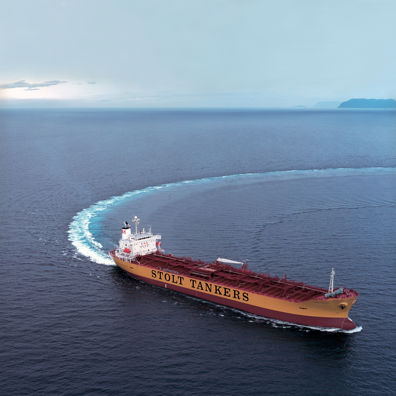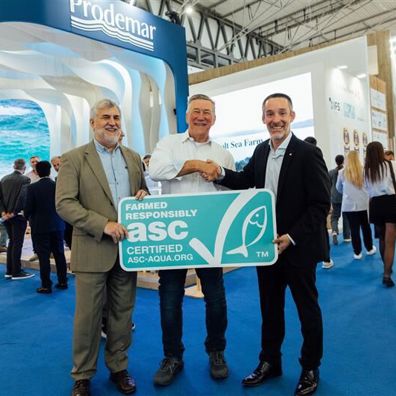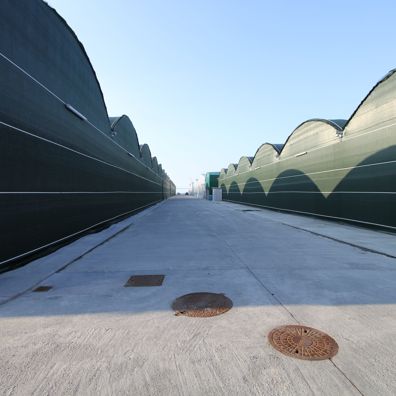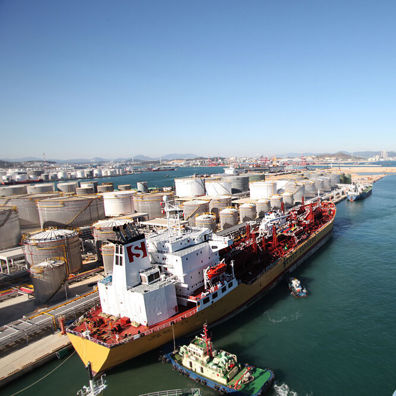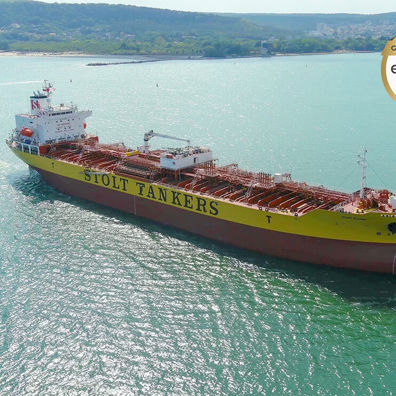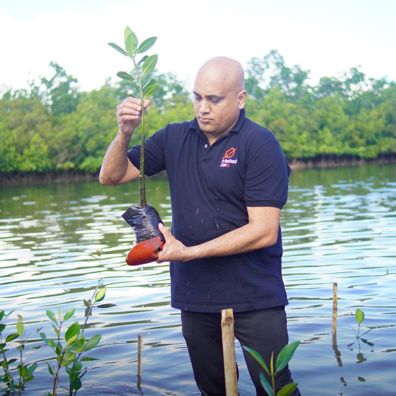Our commitment

The Stolt-Nielsen Board of Directors recognises that how we conduct business impacts our industry, our people, our external stakeholders, and the environment.
The Board, therefore, commits to make sustainability a key part of our business strategy and day-to-day operations. This includes the formulation and communication of targets for a reduction in GHG emissions, safety improvements and a focus on employee wellbeing. We further acknowledge that climate change poses a possible risk for all businesses, and we are therefore ensuring that the businesses build risk mitigation approaches into their business strategies.
As a signatory to the UN Global Compact (UNGC), we are committed to continuing to align our business approach with all the principles that govern the UNGC and to ensuring that these are firmly embedded within our businesses. The businesses have developed goals that will ensure we continue to make good progress in reducing our environmental footprint, in line with the objectives of the UNGC and Sustainability Development Goals which follow from there.
The Board is committed to embedding these principles, together with well-implemented quality management systems, which are critical to providing safe and efficient operations. The Board pledges its commitment to sustainability at Stolt-Nielsen Limited.
Code of conduct
Stolt-Nielsen requires that its business objectives are achieved in an ethical, honest and legal manner, as outlined in our Code of Business Conduct (the Code).
The Code is reviewed and approved by the Board each year. The Company does not tolerate any breach of the Code and individuals found to be in breach are subject to disciplinary action, up to and including termination of employment. The Code sets out principles and rules that apply to all directors, officers, permanent employees, temporary employees, contractors and consultants.
In summary, the Code requires all personnel to comply with all relevant laws, regulations and Company policies at all times, and to behave with integrity, maintaining internal and external relationships in a professional manner, avoiding conflicts of interest, bribery and corruption.
To ensure awareness and visibility of the Code, and to underscore Stolt-Nielsen’s commitment to it, we also:
- display poster-sized copies of the Code prominently at all our locations, translated into local languages as needed
- require all land-based management to complete an annual online Code compliance confirmation
- require all main agents of the Company to periodically confirm compliance with the Code
- require all joint-venture Boards to confirm compliance with the Code annually.
To promote a culture where employees feel comfortable about raising concerns about potential, suspected or actual breaches of the Code without fear of retaliation, victimisation, discrimination or disadvantage, Stolt-Nielsen maintains a whistleblower policy and an online Speak Up system that enables anyone, internal or external, to report confidentially (anonymous or otherwise) directly to the Chairman of the Audit Committee and our Head of Operational Audit. All reports are taken seriously and investigated.

Equal opportunities
Stolt-Nielsen is an equal opportunity employer. We promote a diverse, inclusive and safe environment. In line with our Equal Opportunities Policy, we recruit, train and develop employees who are best suited to the requirements of the job regardless of gender, ethnic origin, age, religion or belief, marriage or civil partnership, pregnancy or maternity, sexual orientation, gender identity or disability. Our commitment to building a diverse and inclusive workforce at all levels of the organisation is based on creating fairness and parity.
Fair treatment and welfare of seafarers
Stolt Tanker’s commitment to the fair treatment and welfare of its seafarers is supported by compliance with mandated standards from several international agreements, conventions and processes. We also provide our seafarers with benefits, resources and support that make service aboard our ships both attractive and valued by our officers and crew. These include:
- Medical insurance for all immediate family members
- Onboard exercise equipment
- Daily, free-of-charge internet access for all seafarers
- Career counselling, guidance and management, emphasising continuous employment to ensure high levels of expertise and to develop outstanding cadets for life-long careers
- Modern training programmes covering safety and operational requirements, as well as mental health
- Dedicated helpline for accessing professional mental health support, anonymously if desired
- Onboard social events
- Empowerment of ship management teams, which helps to drive pride and ownership.
We also create opportunities for our crews and colleagues to share knowledge and best practice. For example, we held seven crew conferences, as well as two dedicated ratings days for junior seafarers, and two Masters’ Clubs for captains and other senior personnel to discuss leadership and strategic matters with Stolt Tankers’ senior management.
Stolt Tankers’ ships operate with valid International Transport Workers’ Federation Union (ITF) agreements (collective bargaining agreements) for all seafarers onboard. We also operate in conformance with the Seafarers’ Bill of Rights of the Maritime Labour Convention (MLC); the International Convention on Standards of Training, Certification and Watchkeeping for Seafarers (STCW); the International Convention for the Safety of Life at Sea (SOLAS); and the International Convention for the Prevention of Pollution from Ships (MARPOL). Compliance is verified through Port State Control and Flag State Inspections.
Safeguarding human rights and dignity
Our commitment to human rights extends across every level of our business, and our supply chains. Many of the countries in which we operate have a high risk of human rights, environmental or business ethics abuses, and we closely monitor these areas.
As a signatory to the UN Global Compact (UNGC), we are committed to aligning our business approach with its principles and to ensuring that these are firmly embedded within our businesses. We also support the principles set out in the UN Universal Declaration of Human Rights, the UN Guiding Principles on Business and Human Rights and the International Labour Organization Core Conventions. Stolt Tankers is a signatory of IMPA ACT and supports its Code of Conduct relating to labour and human rights. The sustainability policies of Stolthaven Terminals and Stolt Tank Containers also include commitments to upholding internationally proclaimed human rights.
For ship recycling, Stolt Tankers only selects yards that operate in accordance with the International Maritime Organization’s (IMO) 2009 Hong Kong Convention for the Safe and Environmentally Sound Recycling of Ships (HKC), which will come into full force on June 26, 2025. No ships were recycled in 2024.
During the recycling of a vessel, Stolt Tankers enforces strict health and safety protocols to protect workers. The process is monitored from start to finish by an onsite surveyor who ensures workers’ rights and conditions are protected and all compliance standards are upheld. Stolt Tankers also randomly validates the status, permits, salary (where allowed, in line with local privacy regulations) and insurance for five workers each month to mitigate the risk of human rights breaches.
In 2024, we received no human rights or child labour grievance reports against Stolt-Nielsen.
Read our Modern Slavery and Human Trafficking Statement 2024.
Compliance at sea
Stolt Tankers’ ships operate with valid International Transport Workers’ Federation Union (ITF) agreements (collective bargaining agreements) for all seafarers onboard. We also adhere to the Maritime Labour Convention (MLC) Seafarers’ Bill of Rights; the International Convention on Standards of Training, Certification and Watchkeeping for Seafarers (STCW); the International Convention for the Safety of Life at Sea (SOLAS); and the International Convention for the Prevention of Pollution from Ships (MARPOL). Port State Control and Flag State Inspections verify our compliance with these conventions.
We document MLC compliance within our Ship Management System, with additional vetting conducted during routine onboard inspections. This vetting is carried out as part of the Oil Companies International Marine Forum/Chemical Distribution Institute (OCIMF/CDI) Tanker Management and Self-Assessment process and through periodic International Safety Management (ISM) audits. DNV GL, the world’s largest ship classification society, carries out these audits on behalf of the Flag States.


Sustainability Report 2024
Stolt-Nielsen and all our businesses report regularly on our commitment to working in a way that is safe for both people and the environment.


